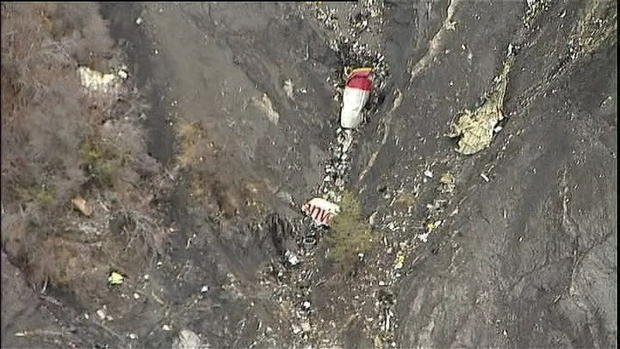Germanwings co-pilot once had "suicidal tendencies"
DUESSELDORF, Germany -- The co-pilot of Germanwings Flight 9525 that crashed into the French Alps last week had received treatment for suicidal tendencies several years ago, prosecutors said Monday.
Duesseldorf prosecutors say co-pilot Andreas Lubitz, 27, had received psychotherapy "with a note about suicidal tendencies" for several years before becoming a pilot.
"In the following period, and until recently, further doctor's visits took place, resulting in sick notes without any suicidal tendencies or aggression against others being recorded," prosecutors' spokesman Ralf Herrenbrueck said in a written statement.
He did not say where this treatment took place. Lubitz trained to be a pilot both in Germany and at the Lufthansa training facility in Phoenix, Arizona.
Authorities believe, based on data from the plane's cockpit voice recorder, that Lubitz locked his captain out of the cockpit and ignored his pleas to open the door while sending the plane into a fatal descent on what should have been a routine flight.
All 150 people on board were killed when the Airbus A320 plane flying from Barcelona to Duesseldorf slammed into a French mountain on March 24 near the Alpine village of Le Vernet.
The crash has prompted wide-ranging questions about Lubitz's motivation, his mindset, aviation industry regulations - and in the minds of the flying public, concerns about air travel safety.
Lufthansa, asked whether the airline had been aware of Lubitz's previous psychotherapy treatment, said only that all medical information is subject to medical confidentiality rules.
Prosecutors said they have so far found no indications in Lubitz's family, his personal surroundings or in his work environment of any motive that might have prompted his actions. They have not found any sign of a physical illness and have no evidence that he told anyone what he was going to do.
German prosecutors said Friday that Lubitz was hiding an illness and sick notes from a doctor for the day of the crash from his employer, but they did not elaborate then on what illness they believed he was hiding. European investigators had already been focused, however, on the psychological state of Lubitz, according to a French police official speaking earlier Monday to The Associated Press.
Asked about reports that Lubitz had problems with his vision, Christoph Kumpa, another spokesman for the Duesseldorf investigators, said there was no evidence showing that Lubitz had any physical ailment affecting his sight.
CBS News correspondent Allen Pizzey reported Monday that the first hints Lubitz could have been planning something unbelievable on the morning of March 24, were contained in a transcript of the cockpit voice recorder, published Sunday by the German newspaper Bild.
Prompted to go over landing procedures for Dusseldorf, Lubitz reportedly used the words "hopefully," and "we'll see," but then said he was fine to man the controls while the pilot took a bathroom break.
When Captain Patrick Sondheimer came back, however, the cockpit door was locked. He knocks, then bangs harder and shouts "For God's sake open the door," according to the published transcript. Passengers are screaming. More banging, and then an automatic warning goes off in the cockpit: "Terrain. Pull up."
The captain screams: "Open the damn door." Inside the cockpit, Lubitz can be heard breathing normally. A sound like metal scraping a mountaintop is heard, more screams, and then nothing.
French officials have refused to confirm or deny the authenticity of the cockpit voice recorder transcript published by Bild, but the events portrayed do seem in line with details given by a French prosecutor last week.
German aviation officials say Lubitz's file at the country's Federal Aviation Office contained a notation that meant he needed "specific regular medical examination," but it did not specify whether it was for a physical or mental condition.
The U.S. Federal Aviation Administration had issued Lubitz a third-class medical certificate. In order to obtain such a certificate, a pilot must be cleared of psychological problems including psychosis, bipolar disorder and personality disorders. The certificate also means that he wasn't found to be suffering from another mental health condition that "makes the person unable to safely perform the duties" of a pilot.
Carsten Spohr, the CEO of Germanwings' parent company, Lufthansa, said last week there was a "several-month" gap in Lubitz's training six years ago, but refused to elaborate. Following the disruption, he said, Lubitz "not only passed all medical tests but also his flight training, all flying tests and checks."
At the crash site in the French Alps, authorities were poring over DNA evidence that has been painstakingly collected from among the crash debris scattered across the steep mountainside. Their goal is to try to identify victims for the grieving relatives who have poured into France by the hundreds.
Workers with backhoes and tractors were laying down a road up to 2 kilometers (1.2 miles) long Monday to reach the remote crash site to help speed the investigation. To date, recovery crews have had to helicopter in and be tethered to local mountaineers to avoid slipping down the rocky, unstable slope.
France has deployed some 500 gendarmes and emergency workers to secure the crash site, search for human remains, examine evidence and help the traumatized relatives.
In the southeastern city of Marseille, Germanwings chief operating officer Oliver Wagner was meeting with victims' relatives.
Wagner recalled a meeting last week in Haltern, Germany, with the parents of 16 high school students who had died in the crash, saying it was "certainly the saddest day of my life."
"They asked 'Why our children?'" he said. "We don't understand what has happened and why it has happened."
